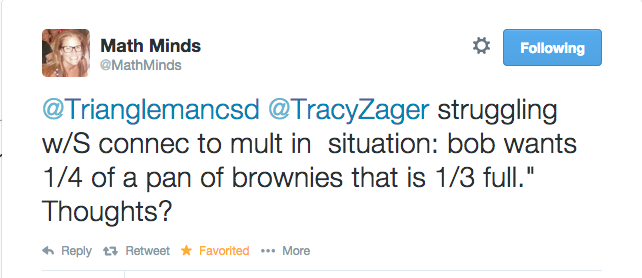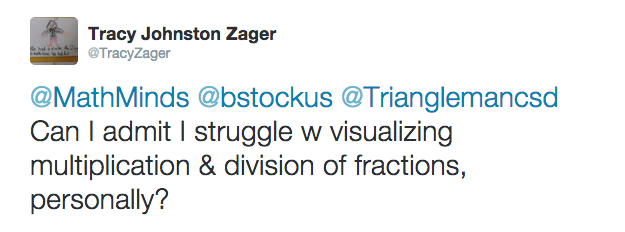One of the central messages of my upcoming book is that elementary teachers have an incredibly hard cycle to break. Almost all of us were taught math very badly. We memorized procedures. We learned rules. We circled keywords. We did it the teacher’s way. Now, we’re all grown up and are expected to teach math for understanding. Yippee!
Except we don’t understand.
In my coaching and writing, I spend a lot of time creating safe spaces for elementary teachers to engage with the powerful and fascinating math we teach, so we can build deep, connected, conceptual understanding. It’s my life’s work to help teachers learn together and alone, from each other and with our students.
But what happens when it’s me? What happens when I don’t understand?
This question came up for me on Twitter today. Kristin asked:

I looked at her question, and thought, “Of means multiply. Why? Why does ‘of’ mean multiply in fractions?” I learned that rule as well as anybody else, but, like Kristin’s students, I am struggling to make the connection. As a fourth-grade teacher, I’ve never had to teach this content, so haven’t yet dug into it enough to re-learn the math meaningfully. Here we were on Twitter, for all the world to see, and she was asking for advice from me, as if I had expertise. I thought for a minute, and then put my money where my mouth is.
That was a hard tweet to write, for a few seconds. Then I saw Kristin’s reply:
And we were off! So began one of my favorite Twitter conversations to date, in which several incredible teachers chimed in, especially Brian Stockus and Zak Champagne. Each of us freely admitted the concepts that were hard for us. We made sense together. We laughed. I had paper next to me, and was sketching and working out ideas and models as we talked. I emerged from today’s conversation a whole lot wiser about multiplying and dividing fractions. Feel free to read the storified version. It’s really good.
When I coach teachers about learning content more deeply, I always talk about how much bravery it takes to admit we don’t understand. Today, it felt great to be brave myself.
Updates:
Brian blogged about “of” after this conversation.
Kristin blogged about our online professional learning community.
And the twitter conversation continues: https://twitter.com/MathMinds/status/509795670530994176 This a meaty topic. We’re not done!



Wow, I’m really happy I found your blog! I love the description in this post of how your expressed your vulnerability, admitted you didn’t know to a peer! What about to your children and students?
In your other post, ‘I’m not Impressed’ you speak about the difference between students being celebrated for regurgitating knowledge vs. encouraging and honouring their thinking, questioning, wondering…
Within this, for me lies that territory of life-long-learning: allowing ignorance, confusion, lack even in our own understanding to be present, showing our kids or students that not knowing is the beginning of wanting to know….
Belinda
Love your comments, Belinda. One thing that’s interesting for me is that I find it much easier to admit I don’t know to kids than I do to peers. In general, I find kids judge less and accept more, and I love modeling not-knowing and learning for them. It’s vital! I wonder how other teachers feel, though? Is it harder to not know with kids or peers?
Last fall, I had an elementary ed. Major struggling with coming up with models involving division of fractions. Yes, I could do the traditional math but was not sure why we did what we did, let alone come up with a model that i could explain. I turned to a copy of a van de walle book for help.
I cannot even begin to imagine how elementary teachers help students form foundational concepts. I have utmost respect.
Thanks for sharing!
Thank you, Pam! I really appreciate that!
Hi.
I found you from Dan Meyer’s blog.
I read the Brian post, and added a comment. basically we have it the wrong way round : “multiply” means “of” is a more natural way of seeing things.
Hi,
It’s good idea. If you are a member of Bigwisdoms, you can find many colleagues to share your experiences. And even, you can find many learners with diverse skills and knowledge covering all lifestyle from art, music, language, leisure, sports, business training and even academic subjects.